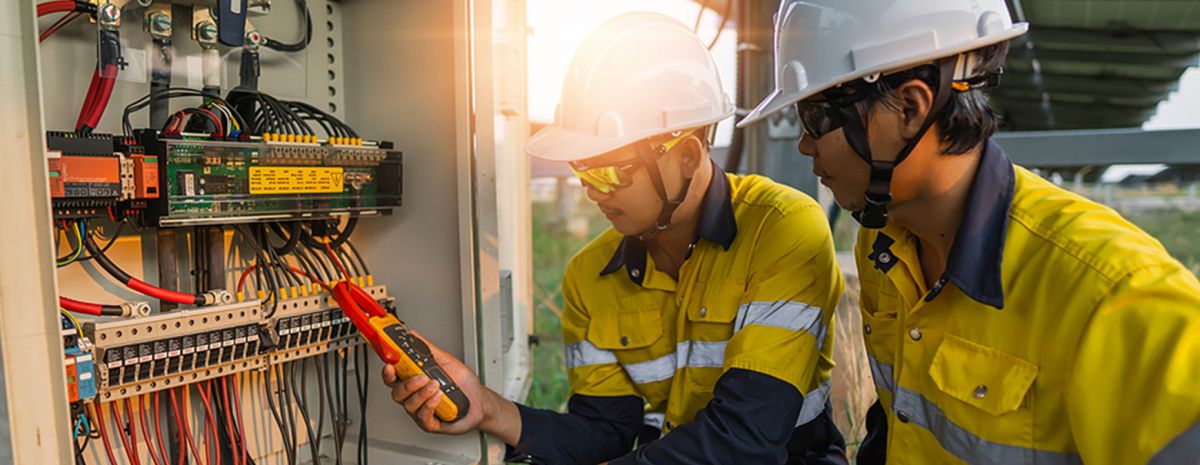
The coronavirus pandemic wreaked havoc upon society in so many ways. One trend that researchers have noticed is that fewer students enrolled in vocational programs during the pandemic, possibly because skilled trades training doesn’t always translate as well to a virtual environment. To learn a practical or mechanical skill, hands-on training can be important.
Now, there’s an employment gap in certain industries, such as manufacturing.1 There are plenty of open jobs in some specialized fields, and not enough workers with the right skills to fill them.1 This marks a good opportunity for recent high school graduates or anyone looking for a career change to consider skilled trades training, for example an electrician training program, in preparation for a post-pandemic workforce.1
What Does Tradesman Mean?
The term “tradesman” simply means “craftsman,” or “worker in a skilled trade.” However, the term “tradesman” is outdated and is more often replaced with the term ‘tradesperson’ or ‘tradespeople’ which more accurately describes the growing population of women in the skilled trades.
You can also think of a tradesperson as someone who works in the building industry in a job that involves physical work and a practical skill.Physical work and practical skills are major elements of the skilled trades.
Practicality may be one reason to consider investing in trade school training. In a survey conducted by the StrataTech Education Group in May 2021, 57% of those who enrolled in or have considered enrolling in a trade school in the past 12 months say the COVID-19 pandemic motivated them to do so. The two main reasons people decided to enroll were to gain real-world practical experience and because of the high rate of job placement after finishing training.2
Get Started on the Path to a New Career
Fill out our form to learn how we can help you change your life.
What’s Considered a Trade Job?
There are many different types of skilled trades with just as many different types of practical job applications. Here are a few of the major, common categories with a few examples of the types of skilled trades jobs in that industry:
Construction Trades
The construction industry involves jobs that contribute to the construction, maintenance and repair of buildings:
- Painter
- Electrician
- Plumber
- Carpenter
Mechanical Trades
The mechanical trades require working with specialized equipment:
- HVAC technician
- Machinist
- Locksmith
- Mechanic
Industrial Trades
The industrial trades involve manufacturing, technology, designing, building and problem solving:
- Ironworker
- Steam engineer
- Metal fabricator
- Paving equipment operator
Skilled Trades Jobs in a Pandemic Economy

COVID-19 caused severe losses of jobs and income across many different sectors for millions of people.3 Yet, the skilled trades have proven essential even in the “pandemic economy.”4 Some sectors even experienced job growth.4,5 For example, electricians, plumbers, pipefitters, welders and construction workers were in demand in certain places.5 Even in a pandemic, buildings still need electrical and plumbing services.5 Skilled trades workers perform important services that keep society running, even in times of crisis.
The overall demand for electricians is especially high, with an expected 84,700 job openings for highly skilled, trained workers every year, on average, over the next decade, according to the Bureau of Labor Statistics (BLS).6 Electricians can gain some of their skills from trade school training and others from an apprenticeship. Some states require electricians to be licensed.
For many people, education is more valuable when it may directly lead to employment.7 Especially now in a post-pandemic economy, it seems that many people are thinking about the value of their chosen educational path, and how it may or may not be related to a tangible, long-lasting career.8 For example, 53% of people surveyed by the Strada Center for Education Consumer Insights said that they would be more likely to enroll in additional education with guaranteed job placement or wage increases.7
What Do Tradespeople Do?
Many workers remained gainfully employed in skilled trades jobs throughout the pandemic.3 But what do tradespeople actually do? This answer can vary widely, depending on the type of job. As mentioned earlier, there are many different types of skilled trades jobs, and each one requires specific, specialized training for a particular purpose or set of tasks.
Because electricians are in relatively high demand and have generally maintained steady employment throughout the pandemic, we can use electricians as an example.
Electricians are a type of skilled trade worker whose training focuses on electrical wiring in buildings. They may need to install, maintain or repair the electrical systems in homes or businesses. This can include anything from outlets to lighting to control systems.
In a typical day, electricians may perform a variety of tasks, such as reading blueprints, inspecting circuit breakers or troubleshooting electrical problems using specific equipment. Electricians draw upon specialized knowledge and years of training to figure out what could be causing electrical problems. All electricians must follow state and local building regulations based on the National Electrical Code (NEC).
Consider a Career in the Trades
Unfortunately, so many people experienced hardship during the pandemic, including loss of employment or inability to work: 62% of individuals who had to find or create additional sources of income for themselves or their families over the course of the COVID-19 pandemic say that the pandemic crisis motivated them to consider enrolling in a trade school.2
If you are feeling drawn to the idea of enjoying relatively stable job security in the skilled trades and are curious about whether enrolling in something like an electrician training program is right for you, don’t hesitate to call The Refrigeration School at 1-866-820-0823.
Additional Sources
1https://hechingerreport.org/students-enrolled-in-job-focused-degree-programs-dropping/
2https://stratatech.com/wp-content/uploads/2021/10/Full-Results-StrataTech3.pdf
3https://cci.stradaeducation.org/pv-release-may-19-2021-back-to-class/
4https://finance.yahoo.com/news/skilled-trade-jobs-booming-pandemic-110000375.html
5https://lancasteronline.com/jobs/skilled-trades-workers-in-high-demand-during-covid-19/article_709f0986-154a-11eb-9e10-a7559cd68e49.html
6https://www.bls.gov/ooh/construction-and-extraction/electricians.htm#tab-6
7https://cci.stradaeducation.org/report/back-to-school/
8https://www.bls.gov/ooh/construction-and-extraction/electricians.htm#tab-2
This blog has been labeled as archived as it may no longer contain the most up-to-date data. For a list of all current blog posts, please visit our blog homepage at https://www.rsi.edu/blog/

